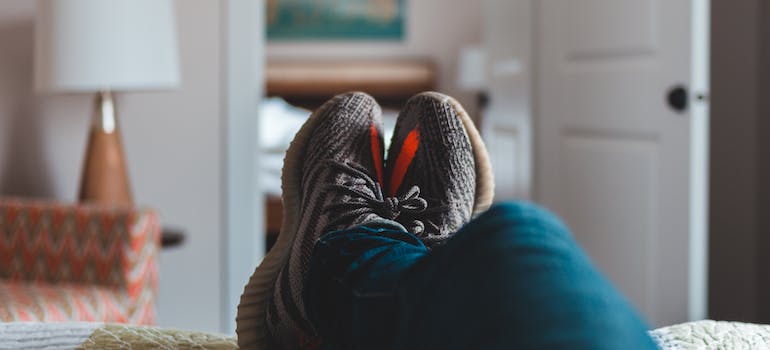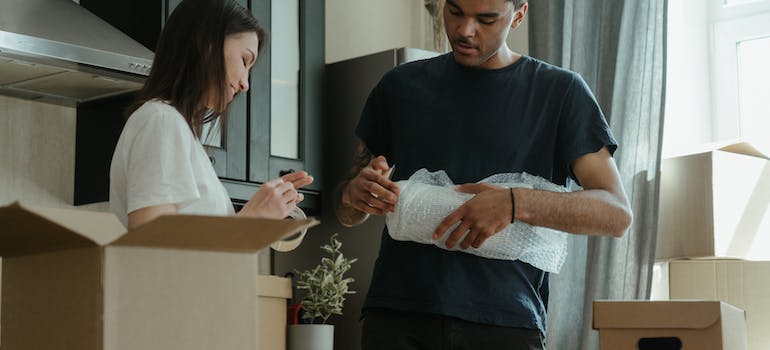Moving into your first apartment marks an exciting milestone, but it’s essential to ensure everything goes easily. When you’re ready to move, make sure you budget for important things like rent, utilities, and groceries. Before you start unpacking, take a close look around the apartment to spot any issues. It’s also crucial to know what you’re responsible for as a tenant. Consider getting renters insurance to protect your stuff. Building a good relationship with your landlord or property manager is key. On the other hand, there are things you should avoid doing. In case you need help with moving, reading Verified Movers reviews will help you find the perfect moving company for your relocation!
Do: Make a Checklist
Creating a moving checklist is one of the most helpful things to do when moving into your first apartment. This checklist serves as a roadmap, ensuring you cover all essential tasks and avoid overlooking important details. First and foremost, it helps you stay organized by breaking down the moving process into manageable steps, from securing utilities to packing belongings. It serves as a reminder for tasks that might slip your mind amid the chaos of moving. With a checklist, you can prioritize tasks effectively, ensuring nothing falls through the cracks. Having a checklist helps reduce stress and anxiety associated with moving, providing a sense of control and direction. Also, it allows for better coordination with movers, landlords, and utility companies, facilitating an easier move into your new space.

Do: Plan Your Budget Wisely
Moving into your first apartment is an exciting step toward independence. But before you get caught up in the thrill of decorating your new space, it’s critical to plan your budget wisely. When planning your budget, start by listing all potential monthly expenses, including rent, utilities (electricity, water, gas), internet, groceries, transportation, insurance, and any debts or subscriptions. Don’t forget to set aside a little each month for savings and emergencies. Once you have a clear overview, you can adjust your spending to ensure you’re living within your means.
Don’t forget to consider the initial costs of moving into an apartment. These can include application fees, security deposits, first and last month’s rent, moving costs, and the need to purchase furniture or household items. To manage these upfront expenses, you might need to save for several months before making the move. If you find that your desired apartment is out of your budget, you may need to look for alternatives, such as different locations, a smaller space, or finding a roommate to share expenses. Some opt for a slightly longer commute to benefit from lower rent prices in neighboring areas.
Remember, living comfortably within your means requires planning and sometimes compromise. By carefully managing your budget, you can enjoy your new apartment without financial stress overshadowing the experience. By anticipating expenses in advance, you can avoid overspending and save money when moving into your first apartment.

Don’t: Ignore the Lease Agreement
Understanding your lease agreement is crucial before moving into your first apartment with the help of long distance moving companies. This document outlines your rights and responsibilities as a tenant, as well as those of your landlord. It covers critical aspects such as the duration of the lease, the amount of rent and when it’s due, policies on pets and visitors, and conditions under which your security deposit may be withheld. Given its importance, take your time to read through the lease carefully. If there’s anything that you don’t understand, don’t hesitate to ask for clarification.
A common mistake first-time renters make is not asking about the lease termination policy. Life is unpredictable, and understanding the process and potential penalties for breaking your lease early can save you significant stress and money in the future. Also, pay attention to clauses about renewing the lease, rent increases, and requirements for personalizing your space. Another key area to focus on is the maintenance and repair policies. Know what your landlord expects from you and what you can expect from them. This includes who handles minor repairs or emergencies like plumbing leaks or electrical issues.
Ensure all agreements or promises made by the landlord or leasing agent are included in the lease. Verbal agreements are challenging to enforce, so having everything in writing is essential for your protection. Signing a lease without fully understanding its terms can lead to avoidable conflicts or financial burdens down the line. Approach this step with the seriousness it deserves to ensure a positive living experience in your new apartment.
Do: Measure Your Space
Before you start purchasing furniture or deciding on where to place your existing items, it’s crucial to measure your new apartment. This step is about more than just making sure your furniture fits through the door; it’s about ensuring your space is functional, comfortable, and aesthetically pleasing. You’ll need to consider the dimensions of each room, the placement of windows, doors, and built-ins, and how your furniture will interact with these elements.
Taking detailed measurements can help you avoid common pitfalls, such as buying a couch that overwhelms the living room or a bed that leaves little space for anything else in the bedroom. Remember, it’s not just about whether something can fit; it’s about whether it should.
Do: Prioritize Essential Furniture First
Furnishing your first apartment is an exciting prospect, but it’s easy to get carried away. With a fresh space all to yourself, the urge to fill it with beautiful furniture and decor can be overwhelming. However, prioritizing essential furniture first is a smart approach. Essentials typically include a bed, a sofa or comfortable seating, a dining table, and storage solutions like a dresser or shelves. Starting with these basics ensures you have a functional living space that meets your daily needs.
Another tip is to consider the quality of the pieces you’re buying. It might be tempting to opt for the cheapest options available, but investing in higher-quality essentials can save you money in the long run, as they tend to last longer and withstand daily use better. You can also think creatively about your furniture. Multi-functional pieces, like a sofa bed or a dining table that can double as a workspace, are excellent for maximizing space in smaller apartments. This approach not only saves money but also keeps your living space versatile and adaptable to your changing needs.
Don’t: Forget to Set Up Utilities
One of the first steps you should take after signing your lease, but before booking local moving services, is setting up your utilities. Essential services like electricity, water, gas, and internet are not just conveniences; they are necessities. The last thing you want is to move into your new place only to find yourself without lights, hot water, or the ability to cook meals.
To avoid this scenario, contact your utility providers at least two weeks before your move-in date. This lead time is often necessary to schedule any appointments for installation or service activation. If you’re unsure who the providers are, ask your landlord or property management company for a list of recommended or required companies. Also, be prepared for initial setup fees or deposits, especially if you’re setting up some utilities for the first time. These costs should be part of your moving budget. Another tip is to research package deals or promotions for services like internet and cable, as these can save you money in the long run.

Don’t: Skip Renters Insurance
Many first-time renters overlook the importance of renters insurance, but it’s a critical component of living in an apartment. This insurance protects your belongings in case of theft, fire, or other damages, offering peace of mind for a relatively low cost. Besides covering your personal property, most renters insurance policies also provide liability coverage, which can protect you in case someone is injured in your apartment and you are found responsible.
Consider the total value of your electronics, clothes, furniture, and other belongings. Replacing these items out-of-pocket could be financially devastating, especially for someone just starting to live independently. Renters insurance is a safety net that ensures you won’t have to start from scratch if the unexpected happens. Another benefit of renters insurance is its coverage for additional living expenses. If your apartment becomes uninhabitable due to a covered peril, your insurance may cover the cost of temporary housing and other necessities.
When shopping for a policy, compare quotes from multiple providers to find the best rate and coverage that suits your needs. Also, make sure to understand what is and isn’t covered by your policy, as some natural disasters or high-value items may require additional coverage. Equally important is having backup plans for settling in, that can address any unexpected challenges that may come up when moving!
Don’t: Rush the Packing Process
Packing in a hurry is a common mistake many make when moving. Rushed packing can lead to broken items, forgotten essentials, and unnecessary stress. To avoid these pitfalls, start packing well in advance of your move date. Create a packing plan that includes a timeline and a list of materials you’ll need, like boxes, tape, and bubble wrap.
Label each box clearly with its contents and the room it belongs to. This organization not only makes unpacking easier but also helps ensure nothing gets lost or overlooked. Consider setting aside a box of essentials—items you’ll need immediately upon moving in, such as toiletries, a few dishes, and bedding. This approach can make your first night in your new apartment more comfortable.
If you’re unsure how to pack delicate items, read about some packing secrets to ease this process. Remember, taking your time with packing can also be an opportunity to declutter, donating or discarding items you no longer need or want.

Do: Choose the Right Location
Choosing the right location when moving into your first apartment is also important for many reasons. Some of the reasons are:
- the location determines your daily commute to work or school, affecting both your time and transportation costs
- the neighborhood’s safety and services directly impact your quality of life
- access to grocery stores, parks, and entertainment can significantly enhance your living experience
The location influences the rental price, with desirable areas often having higher rents. Proximity to friends and family can provide important support networks, especially during moving periods. When relocating, considering factors like these can make sure your move goes more easily. You can check out long distance moving companies that offer expertise and logistical support to make the process of settling into a new area a positive experience.

Do: Get Familiar With New Community
Exploring your new community is vital when moving. Learning about local amenities such as grocery stores, pharmacies, and healthcare facilities ensures you meet your daily needs efficiently. Also, getting to know the public transport system, parks, and leisure spots can significantly improve your living experience and sense of belonging. Building relationships with neighbors not only fosters a supportive network and enhances emotional well-being but also strengthens your connection to the area. Participating in local events or groups further enriches your experience, helping you feel more at home. Whether in a bustling city like New York or a tranquil town such as Fort Collins, integrating into your community positively affects your life in your new apartment.
Don’t: Be Afraid to Ask for Help!
Moving can feel overwhelming, but remember, help is just around the corner. Don’t hesitate to reach out for assistance. Friends and family often jump at the chance to offer a helping hand. For tasks that require a professional touch, consider looking at NorthStar Moving Company reviews. Their reputation for efficient service can take a load off your shoulders. Asking for help, whether from loved ones or professionals, makes your transition into your new space less stressful and more successful.

Moving Into Your First Apartment With Ease
Moving into your first apartment is an adventure filled with lessons and opportunities. By following these do’s and don’ts, you’re well on your way to creating a comfortable, happy home. Remember, it’s all about taking one step at a time and enjoying the journey!




